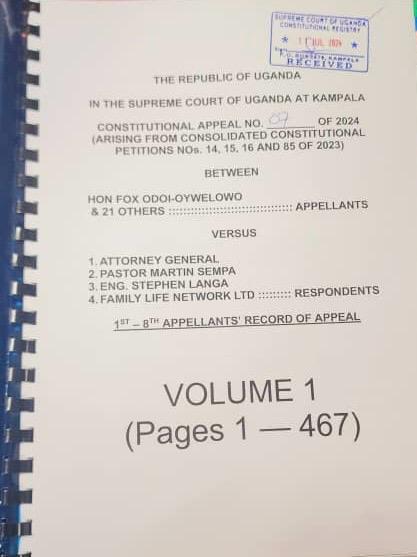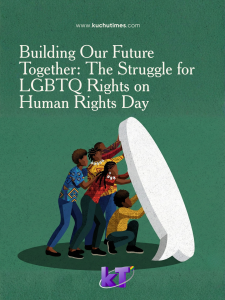PRESS STATEMENT
For immediate release
Uganda’s Supreme Court Should Declare Anti-Homosexuality Act Null and Void. Appeal of the Decision for the Constitutional Court Filed
Kampala, Uganda- July 11th 2024
Twenty-two parties appealed to Uganda’s Supreme Court today to overrule the decision of the Constitutional Court which allowed the 2023 Anti-Homosexuality Act to remain largely in force. The appellants asked the Supreme Court to declare the law null and void and issue a permanent injunction against implementation of the law.
President Museveni signed the Anti-Homosexuality Act into law in May 2023. This was the second time in the last decade that Uganda expanded on British Colonial era anti-sodomy laws. Like its predecessor –which was nullified by the Constitutional Court in 2014 on technical grounds – many provisions of the Anti- Homosexuality Act of 2023 blatantly violate rights to equality, non-discrimination, dignity, and privacy, among other rights, allowing intrusion into the private lives of LGBTIQ+ persons.
In response, two groups filed petitions to Uganda’s Constitutional Court in June 2023 challenging the constitutionality of the law on procedural and substantive grounds, arguing that the law contravenes Uganda’s Constitution and Uganda’s international and regional human rights obligations.
The World Bank paused all lending to Uganda pending further measures and several countries havereduced or reprogrammed assistance in the wake of the law’s passage. Local activists have issued two reports in the last year documenting the breadth and depth of abuses prompted by the debate and passage of the law, including instances in which real and perceived LGBTIQ+ persons were tortured, beaten, arrested, outed and suffered physical, sexual and psychological violence, including forced anal exams, evictions and blackmail, loss of employment and health service disruptions. Frequently, the media sensationally reported cases of suspected LGBTIQ+ persons and called for their elimination.
The implementation of the law has already led to serious abuses and violations of the basic rights of Ugandans. For example, Micheal Opolot is a 21-year-old from Soroti, in Eastern Uganda who was arrested on August 15, 2023 and originally charged with aggravated homosexuality, which carries the death penalty under the Anti-Homosexuality Act. In December, 2023, his charges were amended and are now under Uganda’s British era anti-sodomy law but still more than 300 days later, Opolot remains behind bars and the magistrate is not even coming to court when his case is called. While in detention, he has been subjected to forced anal exams and other torture, and denied his right to bail.
“Opolot’s case is the devastating reality of Uganda’s justice system where the punishment is simply the process itself,”said Richard Lusimbo, a CFE Co-convener. “The State went from seeking the death penalty to not even coming to court to pursue the case against him while he continues to rot behind bars. It is a horrific miscarriage of justice prompted by the absurdities of Uganda’s anti-LGBT sentiments.”
After many delays, in April 2024 Uganda’s Constitutional Court ultimately struck down only two sectionsand two subsections of the Anti-Homosexuality Act and unanimously ruled that the rest of the Act was constitutional. The Court stated that some sections violate the right to health, right to privacy, and right to freedom of religion but failed to identify the numerous ways the law violates Ugandans’ substantive rights to equality, dignity, speech, association and health, and freedom from discrimination.

Today the appellants filed a memorandum of appeal in the Supreme Court of Uganda. In their appeal, they argue that the Constitutional Court erred when it found that there was meaningful and adequate public participation when the Anti-Homosexuality Act was passed. They further argue that the Constitutional Court erred when it found that the law was constitutional.
“The only remedy is for the law to be found null and void,”said Frank Mugisha, and co-convener of CFE. “There is no part of this law that is constitutional substantively or procedurally. There is no way to mitigatethe violence and discrimination it has prompted in our communities. We continue to call on all of Uganda’spartners to stand in solidarity to defend basic principles of non-discrimination and inclusive economicdevelopment.”
For more information, please contact:
CFE Co-Conveners
Full statement here: https://www.kuchutimes.com/wp-content/uploads/2024/07/CFE-PETITIONS-SUPREME-COURT-ON-AHA-.pdf





